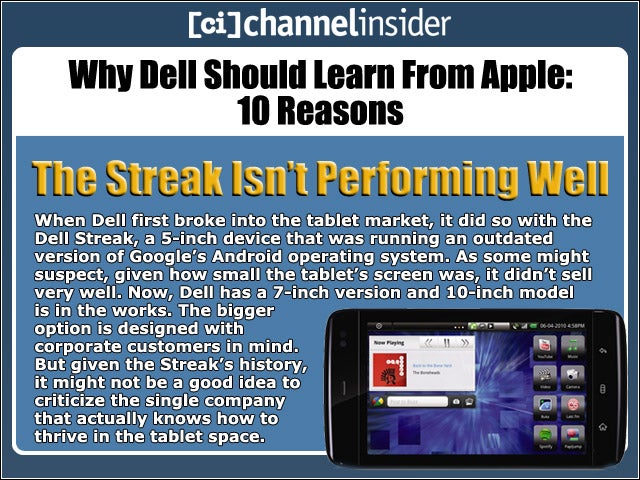 The Streak Isn’t Performing Well
The Streak Isn’t Performing Well
When Dell first broke into the tablet market, it did so with the Dell Streak, a 5-inch device that was running an outdated version of Google’s Android operating system. As some might suspect, given how small the tablet’s screen was, it didn’t sell very well. Now, Dell has a 7-inch version and 10-inch model is in the works. The bigger option is designed with corporate customers in mind. But given the Streak’s history, it might not be a good idea to criticize the single company that actually knows how to thrive in the tablet space.
 The iPad Is Selling Well
The iPad Is Selling Well
Apple’s iPad, unlike the Dell Streak, is performing extremely well at retail. The iPad 2 is still unavailable in stores and those who order the device online will need to wait weeks for the tablet to finally arrive in a customer’s home. Given that success, and after comparing it to the Dell Streak, it’s hard to see why Apple would be the target of Dell’s criticism, rather than the inspiration for all of its future products.
 HP Is A Threat
HP Is A Threat
One of the most important reasons Dell should learn from Apple right now is because it’s facing serious pressure from its top competitor: HP. Earlier this year, HP unveiled its TouchPad tablet, which will be running its WebOS platform. Though that device has its sights set on the iPad, Dell can’t allow HP to get too far ahead. If users like what they find in HP’s option, they might just like its PCs even better going forward when the company starts adding WebOS to its computers. Make no mistake that HP is a real threat right now.
 The Enterprise Is There For the Taking
The Enterprise Is There For the Taking
Although Dell’s marketing chief took time to hit Apple, he also talked about Apple’s plans for the enterprise. He said that the 10-inch Dell Streak will be an ideal fit for corporate customers. By the looks of things, that certainly seems true. But rather than spend time criticizing Apple, Dell should learn from the company about what not to do to appeal to corporate customers. Apple has the consumer space in its grasp, but the enterprise is there for the taking. The last thing Dell will want to do is follow Apple’s lead.
 Michael Dell Is No Steve Jobs
Michael Dell Is No Steve Jobs
At times, companies believe their executives will have the ability to make the kind of decisions that Steve Jobs would make. In some cases, that’s true. But when it comes to Dell, it’s simply not. Realizing that, Dell should spend time trying to learn about what makes Steve Jobs so successful, and not spending time trying to say what he does is wrong. The reality is, Jobs hasn’t made any missteps in the tablet space. And he can teach Michael Dell quite a bit.
 A Multi-OS Strategy Won’t Work
A Multi-OS Strategy Won’t Work
In addition to criticizing Apple, Dell’s marketing chief said that his company plans to offer a multi-platform tablet strategy, releasing devices that have both Android and Windows 7. It’s a bad idea. If Apple has proven anything, it’s that giving customers a consistent experience is integral to success in the tablet market. HP has seemingly learned that lesson with the TouchPad. When will Dell do the same?
 It’s Not Constructive
It’s Not Constructive
One of the things that Dell must always keep in mind is that its tablets, no matter which market they will be targeting, will be compared to the iPad 2. So, rather than try and say that the iPad isn’t a desirable product, it’s perhaps a better time for the company to examine the iPad 2, find out what makes it special, and figure out how to beat it. Criticizing the iPad 2 won’t win Dell any fans; offering a better device will.
 Apple Has Beaten RIM
Apple Has Beaten RIM
If Dell really has designs on the enterprise, the first thing the company should be doing is trying to learn about how Apple has single-handedly taken RIM down in the mobile market. Prior to the launch of the iPhone, RIM was a major player in the smartphone space. Now, it’s a shadow of its former self. In the coming weeks, RIM will be releasing its BlackBerry PlayBook for enterprise customers. Dell will need to find ways to beat that device if it wants to be the corporate world’s favored tablet provider. It can only do that if it can analyze Apple’s strategy when it harmed RIM’s business and try its best to follow the same path.
 Cisco’s Android Threat
Cisco’s Android Threat
If Dell needs to be concerned about RIM and its BlackBerry PlayBook, the company should also be thinking about the Cisco Cius. That device is designed for corporate customers, as well, but it will be running Android. If Apple has done anything in the tablet space, it has shown how to beat Android-based devices. The time has come for Dell to do the same—with the help of Windows.
 Failure Is Worrisome
Failure Is Worrisome
The last thing Dell can do is allow its streak of bad luck in the tablet space to continue. It needs to find a way to attract customers through innovative products, solid tablet designs, and the kind of advertising that gets people excited. Apple has all that. And it will continue to have that. Dell should keep that in mind, stop firing shots at Apple, and learn something from what Apple has been doing to build hype for its products. Doing so is central to Dell’s future in the tablet space.

